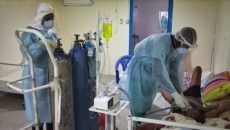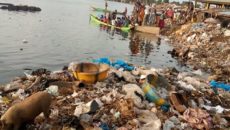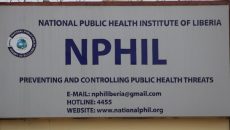In May 2014, I moved to Liberia to work with one of the many NGOs that sprouted up in the country after the civil war ended in 2003.
Several months earlier, the first reports of an unprecedented outbreak of the Ebola Virus Disease (previously unknown in West Africa) had emerged. At the time, I largely ignored them. As I uprooted my life for what I expected to be a prolonged residence in Liberia, I had no inkling that the virus would shortly insinuate itself in my life in a dramatic way.
Much like the ongoing Coronavirus pandemic, Ebola revealed global inequities and exerted a debilitating psychological drag alongside its medical effects. My fellow Americans, who were so quick to condemn West Africa(ns) during the Ebola crisis, would be well served to recall their recent alarm as they struggle to address the Coronavirus.
Coming to Terms with the Virus
After reports of a spate of Ebola cases in March in April, there appeared to be a lull in the virus’ spread. Few cases were reported in Liberia during the month of May when I arrived.
This proved to be the calm before the storm, however. By late June, communities in Monrovia were beginning to be considered epicenters of the outbreak, whereas previously the preponderance of cases had been confined to the northern borderlands.
However, it was only with the July death in Nigeria of Patrick Sawyer, a Liberian-American consultant for Liberia’s Ministry of Finance, that the tempo of everyday life really began to change. Sawyer’s passing was quickly followed by that of Samuel Brisbane, a leading doctor.
An environment riddled with tension and angst enveloped Monrovia, as a previously weary populace began to accept the seriousness of the unfolding developments. This situation contrasted markedly with the U.S. response to COVID-19, where the country’s views on the gravity of the epidemic have been divided, even as cases skyrocket.
Responding to the Virus
I soon left Liberia behind for the remainder of the year, but my colleagues later told me of a grim, intense period of earnest work. My employer was involved in work around good governance, but we quickly pivoted to a number of projects raising awareness about Ebola, as did practically every NGO in the country.
In early August, I departed on a previously scheduled business trip. The scene at the Monrovia airport, was grim, with worried masked individuals crowding the low-capacity airport. Conversely, despite the disruption COVID-19 has wreaked on American lives, and the explicit guidance to wear masks in public settings, it is not uncommon for travelers to refuse to wear masks.
I thought I would soon be back in Monrovia, perhaps having to delay my return by a few extra weeks. However, as with those who anticipated that the Coronavirus pandemic would only briefly interrupt their routines, I was severely mistaken.
Politicizing the Virus
When I arrived in the U.S. in October, Americans were firmly in the grip of Ebola hysteria, although the country had seen only a handful of cases.
In a marked reversal of the current politicized response to the coronavirus in the USA, Republican governors in New Jersey (Chris Christie) and Maine (Paul LePage) took a hard-line approach, advocating for an American nurse who treated Ebola patients in Sierra Leone to remain in isolation. The nurse had initially displayed an elevated body temperature, but subsequently tested negative for Ebola.
Republicans in Congress also attempted to restrict travel to the U.S. from the West African nations affected by Ebola. They were backed by Donald Trump, then a private citizen, issuing a string of tweets expressing his concern with the virus and urging the US to ‘Stop the Flights!’
Conversely, in Liberia, George Weah, then in opposition, was on the same page with the government. He raised awareness about Ebola through song and also served as the government’s Peace Ambassador until November 2014.
Americans denigrated West Africans for not taking the crisis seriously and refusing to follow international health guidance, such as cremating loved ones who passed away from the virus. The inability of the U.S. to get the Coronavirus epidemic under control as a result of massive resistance to expert guidance shows how hypocritical these judgments were.
In September 2014, a team of Ebola health experts was massacred in Guinea, drawing widespread, incredulous criticism among Western expats in Liberia. Yet just a few years later, President Trump called on Americans to ‘liberate’ states who had imposed stringent lockdowns to stem the coronavirus spread. His rhetoric apparently spurred armed protestors to demonstrate at the capitol building in the U.S. state of Michigan.
Recovering from the Virus
Beyond illuminating American hypocrisy, West Africa’s experience with Ebola holds a number of sobering lessons for Coronavirus-ravaged nations in the economic sphere as well.
The core of central Monrovia is not the same post-Ebola. My favorite Liberian club, Pepper Bush, closed, never to reopen. The same was true of my favorite rooftop drinking spot, the Bamboo Bar. In perhaps a sign of the changes Western nations may expect as they recover from the Coronavirus, Monrovia’s development has increasingly centered on the more spacious Sinkor suburb (there are notable exceptions).
Liberia’s international connections have also failed to bounce back to their pre-Ebola levels. British Airways and Delta halted flights to Liberia during the Ebola outbreak and never returned. Regionally, Gambia Bird, The Gambia’s national carrier, collapsed as a result of Ebola-induced pressure.
The international attention Liberia, Sierra Leone, and Guinea received as a result of the outbreak had little lasting impact. Billions of dollars were pledged to Ebola relief – although only a third of it has been disbursed, according to the United Nations. Furthermore, most of what was spent provided for the implementation of temporary stop-gap measures, rather than long-term improvements.
For several weeks during the latter part of the Ebola outbreak, the Liberia Water and Sewage Corporation was unable to provide piped water to most of Monrovia. Shockingly, the government of Liberia and the international community were not able to leverage the moment to transform the delivery of the good essential for the hygiene practices needed to contain Ebola. Yet, West African countries were able to mobilize contract-tracing efforts in a way that the U.S. has utterly failed.
Comparisons between Ebola and the Coronavirus are inexact. Nonetheless, a coterie of officials from the Ellen Johnson Sirleaf administration, including the president herself, penned opinion pieces in the early stages of the Coronavirus pandemic, highlighting Liberia’s lessons learned and success in beating back the virus. These pieces were generally laudatory of the administration’s response.
Conclusion
African nations have learned much from their Ebola experience – Senegal seems to have been particularly effective in proactively working to minimize the spread of the coronavirus, offering a bed to all infected (and their contacts). However, given the poor American response to Coronavirus, focusing on the grim outcomes and lost opportunities of Liberia’s Ebola crisis might make for think pieces that better resonate with American policymakers.
Ebola hysteria prevailed among many Americans in 2014. While their sentiments were misguided and rooted in discriminatory and xenophobic attitudes, recalling them would at least remind Americans of a time when they took a global health crisis seriously.
Featured photo by UNMEER/Martine Perret



